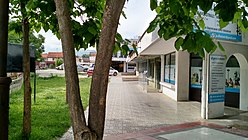Suva Reka massacre
| Suva Reka massacre | |
|---|---|
Serbian law enforcement |
The Suva Reka massacre (
Massacre

There were 48 victims of the Suva Reka massacre, including fourteen who were under 15 years old. Forty-six were members of the Berisha family - who were targeted because they had rented one of their homes to the OSCE observers in Suva Reke/Suharekë, who provided a sense of security to the local Albanians but withdrew from the area when NATO bombing began.[3] A woman and two children survived the massacre. The victims were locked inside a pizzeria into which two hand grenades were thrown. Before taking the bodies out of the pizzeria, the police allegedly shot anyone still showing signs of life. The bodies of the victims were later transported to Serbia and buried in mass graves near a police facility at Batajnica, near Belgrade.[1]
Aftermath
The investigation into the Suva Reka massacre started three years after the mass graves in Serbia had been discovered. More than 100 witnesses were questioned during the trial, including Shureta Berisha, who survived the crime by jumping out of the truck that was transporting the corpses.[4] Serbia's War Crimes prosecutor has charged eight policemen for the massacre, including members of the 37th SPU of the Serbian MUP. Key witnesses of the Office of the Prosecutor are former police members who are able to describe in detail the murder of Albanian civilians and the removal of their bodies from Suva Reka.[2]
After a three-year trial, a War Crimes court found four former policemen guilty of the massacre and sentenced two of them to a maximum of 20 years in jail, one to 15 years and another to 13 years.[5] However, the Serbian War Crimes prosecutors said that they would appeal the verdicts, especially because the prime suspect — the commander of the unit that carried out the massacre — was acquitted.[5] Suva Reka is the first war crimes case in Serbia related to the mass graves discovered after Slobodan Milošević's ouster.[6]
See also
- List of massacres in the Kosovo War
- War crimes in Kosovo
Sources
- ^ a b Ivana Nikolić (26 March 2016). "Activists March to Kosovo Mass Grave in Belgrade". Balkan Insight. Retrieved 26 March 2016.
- ^ a b "War Crimes Trials in Serbia". B92.net.
- ^ "UNDER ORDERS: War Crimes in Kosovo - 13. Suva Reka Municipality". www.hrw.org. Retrieved 2019-06-18.
- ^ "Serbia war crimes court convicts ex-police of Suva Reka Massacre". Archived from the original on 2020-05-24. Retrieved 2009-11-01.
- ^ a b "Serbia jails ex-policemen for Kosovo massacre". The Independent. April 23, 2009.
- ^ "Serbia detain nine in Kosovo massacre". www.chinadaily.com.cn.
